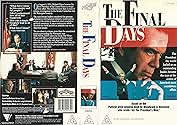Chronicle of Nixon's last months in the White House. A paranoid power-abuser, all too human - a confused, narcissistic individual who cannot fully comprehend how, in less than one year, he l... Read allChronicle of Nixon's last months in the White House. A paranoid power-abuser, all too human - a confused, narcissistic individual who cannot fully comprehend how, in less than one year, he lost everything he has worked for in a lifetime.Chronicle of Nixon's last months in the White House. A paranoid power-abuser, all too human - a confused, narcissistic individual who cannot fully comprehend how, in less than one year, he lost everything he has worked for in a lifetime.





















